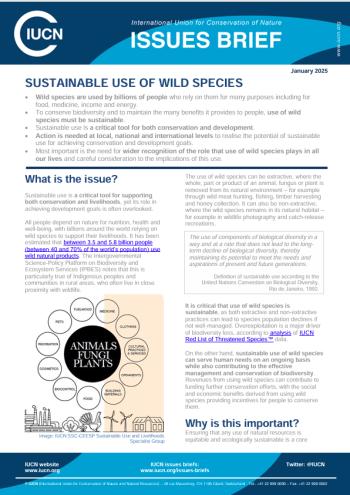

Economic Analysis: Climate Change and Wildlife Utilization on Private Land
Wildlife ranching is emerging as a new frontier for wildlife conservation
and alternative land use for agriculture in marginal areas of Southern Africa.
However, the wildlife sector also faces climate-related challenges. In this study, we investigated the effects of climate change on the revenues of wildlife ranchers in South Africa. This paper applied a median Ricardian modelling on net farm revenues using a sample of 506 wildlife ranches drawn from the latest version (2007) of Census of Commercial Agriculture data for South Africa.
The paper used three Atmospheric-Oceanic Global Circulations, including CSIRO2, Parallel Circulation Model, and Hadley Centre Coupled model, which have been used for South African agriculture modelling, to predict the impact of climate change in the future.
The study confirms that the current climate affects the net revenues of wildlife ranches across South Africa, especially in cases where small-scale wildlife ranches are involved. For example, by 2050, climate change could reduce net revenues from wildlife by up to 28%. In certain regions, the models predict modest gains in revenues towards 2,100. Revenues of specialized wildlife ranches would be more affected in the long run than those of ranches that practice mixed wildlife and livestock ranching.
Keywords: Wildlife Ranching; Climate change; Ricardian JEL classification: Q50; Q54; Q57; Q15
Otieno, J. Muchapondwa, E. 2015, An Economic Analysis of Climate Change and Wildlife Utilization on Private Land: Evidence from Wildlife Ranching in South Africa. Economic Research Southern Africa (ERSA) working paper 553.
-
Edwin Muchapondwa
-
Jackson Otieno
We support the free flow of information. Please share:
Form coming soon
Related Content
-

-

Review of African Social and Economic Development Volume 1
ByIbrahim Bàbátúndé Anobaarrow_forward2024 -

Economic Analysis: Climate Change and Wildlife Utilization on Private Land
ByJackson OtienoEdwin Muchapondwaarrow_forward2015
Get updates by email
Through impactful research, stakeholder engagement, and professional development, AWEI is supporting the wildlife economy across Africa. Please subscribe for occasional updates on our work and forthcoming events.
Sign up for a quarterly dose of AWEI insights
In a complex and changing world, AWEI generates strategic ideas, conducts independent analysis on wildlife economies, and collaborates with global scholar-practitioners to provide training and expertise for biodiversity conservation, climate resilience, and inclusive economic opportunities in Africa.
